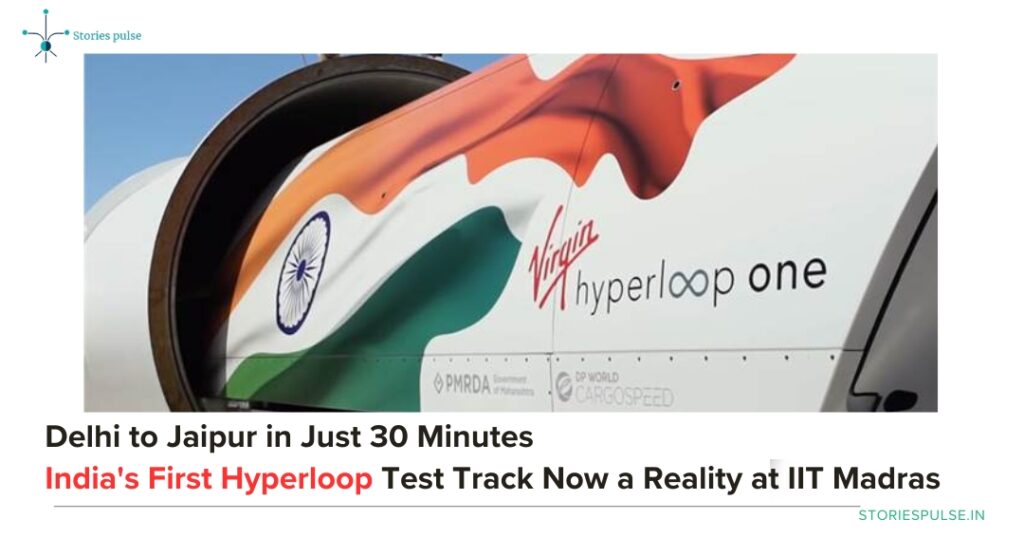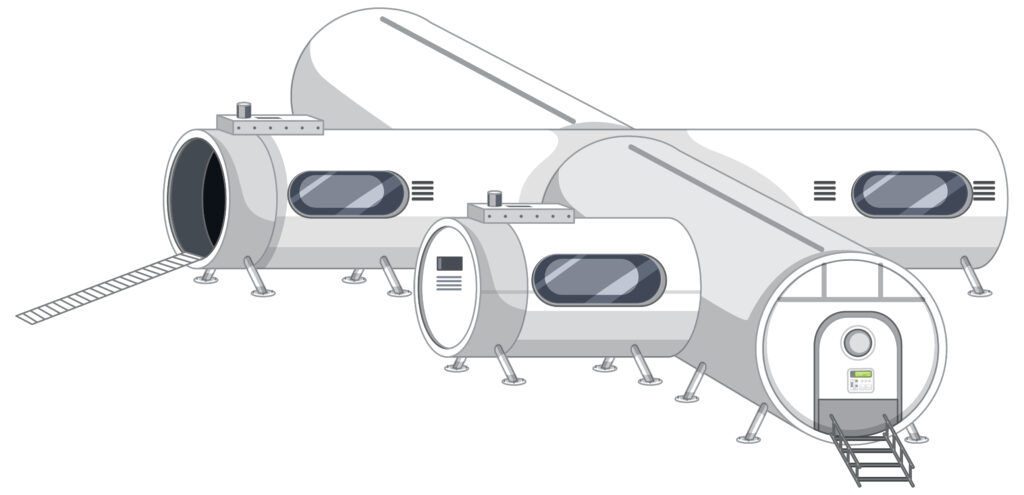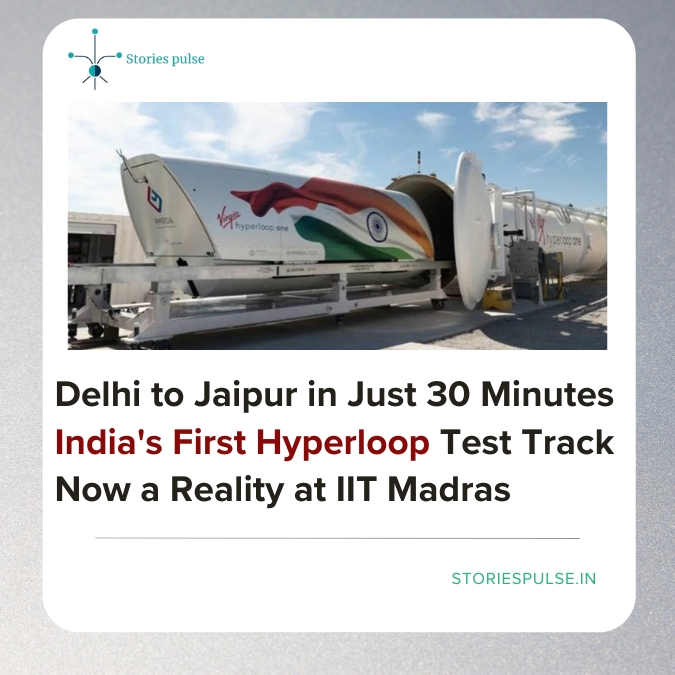India’s first hyperloop test track at IIT Madras marks a significant leap in transportation technology. This groundbreaking project could reduce travel time between Delhi and Jaipur to just 30 minutes, revolutionizing how we commute. Hyperloop, a futuristic system using magnetic levitation and low-pressure tubes, promises speeds of up to 1,200 km/h. With this development, India joins global efforts to adopt this cutting-edge technology, aiming for faster, greener, and more efficient travel.

What is Hyperloop Technology?
Hyperloop is a high-speed transportation system that propels passenger or cargo pods through low-pressure tubes using magnetic levitation. Conceptualized by Elon Musk in 2013, it combines the speed of air travel with the convenience of ground transport. Capable of reaching speeds up to 1,200 km/h, the hyperloop is energy-efficient, eco-friendly, and operates with minimal friction. This technology could transform urban mobility, offering a sustainable alternative to traditional transportation methods while drastically reducing travel times between cities.
- Ultra-High Speed: Capable of reaching speeds up to 1,200 km/h.
- Energy Efficiency: Powered by renewable energy sources like solar power.
- Low Friction: Operates in near-vacuum tubes to minimize air resistance.
- Eco-Friendly: Produces zero direct emissions, making it a sustainable alternative.
- This technology could transform urban mobility, offering faster, greener, and more efficient travel options for commuters and businesses alike.
Timeline of Hyperloop Development in India From Concept to Reality
The journey of hyperloop technology in India has been a fascinating one, marked by innovation, collaboration, and ambitious goals. Below is a timeline that traces the evolution of hyperloop projects in India, from the initial concept to the present-day developments.
Read More : Hyperloop Alternative Concept (Soft-Sided Transportation Tubes SSTTs)
2013: The Birth of Hyperloop
- Global Concept: Elon Musk introduces the hyperloop concept, envisioning a high-speed transportation system using low-pressure tubes and magnetic levitation.
- Initial Interest: Indian researchers and policymakers begin exploring the feasibility of hyperloop technology for the country’s growing transportation needs.
2017: Early Discussions and Feasibility Studies
- Virgin Hyperloop Meetings: Virgin Hyperloop One (now Hyperloop One) holds discussions with Indian officials, including Maharashtra Chief Minister Devendra Fadnavis, to explore hyperloop projects.
- Pune-Mumbai Hyperloop Proposal: A feasibility study is initiated for a hyperloop corridor connecting Pune and Mumbai, aiming to reduce travel time to 25 minutes.
2019: First Major Agreement Signed
- Maharashtra Government Agreement: The Maharashtra government signs a Framework Agreement with Virgin Hyperloop One to build a Pune-Mumbai hyperloop corridor.
- Project Scope: The proposed corridor aims to transport passengers at speeds of up to 1,000 km/h, making it one of the fastest transportation systems in the world.
2020: Hyperloop Testing and Global Developments
- Global Progress: Virgin Hyperloop conducts the first successful passenger test in Nevada, USA, boosting confidence in the technology.
- Indian Interest: Indian states like Tamil Nadu and Karnataka express interest in developing hyperloop corridors to enhance connectivity.
2021: IIT Madras Takes the Lead
- IIT Madras Initiative: IIT Madras established the Avishkar Hyperloop team, a student-led group focused on developing hyperloop technology.
- Awards and Recognition: The team wins accolades at international competitions, showcasing India’s potential in hyperloop innovation
2022: India’s First Hyperloop Test Track Announced
- Test Track Announcement: IIT Madras announces the development of India’s first hyperloop test track at its Discovery Campus in Chennai.
- Collaborations: Partnerships with global hyperloop developers and Indian infrastructure companies are formed to accelerate progress.
2023: Test Track Becomes Operational
- Operational Test Track: The 400-meter hyperloop test track at IIT Madras becomes operational, marking a significant milestone.
- Delhi-Jaipur Corridor Proposal: Plans for a hyperloop corridor between Delhi and Jaipur gain momentum, with the aim of reducing travel time to 30 minutes.
Present Focus on Commercialization and Expansion
- Current Status: The test track is being used to validate hyperloop technology for Indian conditions, with a focus on safety and efficiency.
- Future Projects: Proposals for additional corridors, such as Delhi-Mumbai and Chennai-Bengaluru, are under discussion.
- Government Support: Increased funding and policy backing are expected to drive the commercialization of hyperloop technology in India.
| Year | Event | Details |
|---|---|---|
| 2013 | The Birth of Hyperloop | – Global Concept: Elon Musk introduces the hyperloop concept, envisioning a high-speed transportation system using low-pressure tubes and magnetic levitation. |
| – Initial Interest: Indian researchers and policymakers begin exploring the feasibility of hyperloop technology for the country’s growing transportation needs. | ||
| 2017 | Early Discussions and Feasibility Studies | – Virgin Hyperloop Meetings: Virgin Hyperloop One holds discussions with Indian officials, including Maharashtra CM Devendra Fadnavis, to explore hyperloop projects. |
| – Pune-Mumbai Hyperloop Proposal: A feasibility study is initiated for a hyperloop corridor connecting Pune and Mumbai, aiming to reduce travel time to 25 minutes. | ||
| 2019 | First Major Agreement Signed | – Maharashtra Government Agreement: The Maharashtra government signs a Framework Agreement with Virgin Hyperloop One to build a Pune-Mumbai hyperloop corridor. |
| – Project Scope: The proposed corridor aims to transport passengers at speeds of up to 1,000 km/h, making it one of the fastest transportation systems in the world. | ||
| 2020 | Hyperloop Testing and Global Developments | – Global Progress: Virgin Hyperloop conducts the first successful passenger test in Nevada, USA, boosting confidence in the technology. |
| – Indian Interest: Indian states like Tamil Nadu and Karnataka express interest in developing hyperloop corridors to enhance connectivity. | ||
| 2021 | IIT Madras Takes the Lead | – IIT Madras Initiative: IIT Madras establishes the Avishkar Hyperloop team, a student-led group focused on developing hyperloop technology. |
| – Awards and Recognition: The team wins accolades at international competitions, showcasing India’s potential in hyperloop innovation. | ||
| 2022 | India’s First Hyperloop Test Track Announced | – Test Track Announcement: IIT Madras announces the development of India’s first hyperloop test track at its Discovery Campus in Chennai. |
| – Collaborations: Partnerships with global hyperloop developers and Indian infrastructure companies are formed to accelerate progress. | ||
| 2023 | Test Track Becomes Operational | – Operational Test Track: The 400-meter hyperloop test track at IIT Madras becomes operational, marking a significant milestone. |
| – Delhi-Jaipur Corridor Proposal: Plans for a hyperloop corridor between Delhi and Jaipur gain momentum, aiming to reduce travel time to 30 minutes. | ||
| Present | Focus on Commercialization and Expansion | – Current Status: The test track is being used to validate hyperloop technology for Indian conditions, with a focus on safety and efficiency. |
| – Future Projects: Proposals for additional corridors, such as Delhi-Mumbai and Chennai-Bengaluru, are under discussion. | ||
| – Government Support: Increased funding and policy backing are expected to drive the commercialization of hyperloop technology in India. | ||
| 2024-2025 | Expansion of Test Tracks and Advanced Testing | – Expansion of Test Tracks: Additional test tracks and advanced testing of hyperloop pods will be carried out to refine technology. |
| 2026-2027 | Construction of the First Commercial Hyperloop Corridor | – Delhi-Jaipur Route: Construction of the first commercial hyperloop corridor, likely between Delhi and Jaipur, is expected to begin. |
| 2030 | Expected Operationalization of Multiple Hyperloop Corridors | – Expansion: Multiple hyperloop corridors across India are expected to become operational, revolutionizing urban mobility and connectivity. |
What’s Next for Hyperloop in India?
- 2024-2025: Expansion of test tracks and advanced testing of hyperloop pods.
- 2026-2027: Construction of the first commercial hyperloop corridor, likely the Delhi-Jaipur route.
- 2030: Expected operationalization of multiple hyperloop corridors across India, transforming urban mobility and connectivity.
India’s First Hyperloop Test Track at IIT Madras
The hyperloop test track at IIT Madras is a collaborative effort between the institute and private hyperloop developers. Located at the Discovery Campus in Chennai, the 400-meter track aims to validate hyperloop technology for Indian conditions. This project is a crucial step toward building commercial hyperloop corridors, such as the proposed Delhi-Jaipur route. By testing and refining the technology, India is positioning itself as a key player in the global hyperloop race.
- Location: IIT MadraMadras’sovery Campus in Chennai.
- Length: The initial test track spans 400 meters, with plans for expansion.
- Purpose: To validate hyperloop technology for Indian conditions.
- Significance: Marks India’s entry into the global hyperloop race.
- This project is a crucial step toward building commercial hyperloop corridors, such as the proposed Delhi-Jaipur route, and demonstrates India’s commitment to innovation in transportation.
Global Hyperloop Projects vs. India
Globally, countries like the US, UAE, and South Korea are leading hyperloop development. Virgin Hyperloop in the US has conducted successful passenger tests, while the UAE is exploring a Dubai-Abu Dhabi route. South Korea is building a Seoul-Busan corridor. In comparison, India’s hyperloop project is in its early stages but shows immense potential. The Delhi-Jaipur corridor could become a model for future hyperloop networks, enhancing India’s position in next-generation transportation technology.
- US: Virgin Hyperloop has conducted successful passenger tests and plans commercial deployment by 2030.
- UAE: The proposed Dubai-Abu Dhabi hyperloop aims to reduce travel time to 12 minutes.
- South Korea: Developing a Seoul-Busan corridor with test tracks under construction.
- India: Focused on the Delhi-Jaipur corridor, with a test track operational at IIT Madras.
- While India is in the early stages, its focus on innovation and collaboration could accelerate progress.
Delhi-Jaipur Hyperloop A Game-Changer for Rajasthan
The proposed Delhi-Jaipur hyperloop corridor could transform Rajasthan’s economy and connectivity. By reducing travel time to 30 minutes, it will boost tourism, making Jaipur and other destinations more accessible. Enhanced connectivity will stimulate trade and investment, creating thousands of jobs. Additionally, the hyperloop’s eco-friendly design aligns with India’s sustainability goals. For Rajasthan, this project represents a unique opportunity to become a hub for innovation and economic growth.
- Boost to Tourism: Faster travel will make Jaipur and other destinations more accessible.
- Economic Growth: Enhanced connectivity will stimulate trade and investment.
- Job Creation: Construction and operation will create thousands of jobs.
- Sustainability: Eco-friendly design aligns with India’s green goals.
- For Rajasthan, this project represents a unique opportunity to become a hub for innovation and economic development.
Benefits of Hyperloop for India
Hyperloop technology offers numerous benefits for India, including faster travel, reduced congestion, and lower carbon emissions. By connecting major cities like Delhi and Jaipur, it will enhance economic and cultural exchange. The project will also create jobs and attract global investment, positioning India as a leader in advanced transportation. With its focus on sustainability, hyperloop aligns with India’s vision of a greener future, making it a key component of the country’s infrastructure development.

- Faster Travel: Reduces travel time between major cities significantly.
- Reduced Congestion: Alleviates pressure on existing transportation networks.
- Lower Emissions: Eco-friendly design supports sustainability goals.
- Economic Growth: Enhances trade, tourism, and investment opportunities.
- By adopting a hyperloop, India can address urban congestion, reduce pollution, and create a more efficient transportation network for future generations.
Challenges in Implementing Hyperloop Technology
Despite its potential, hyperloop technology faces several challenges. High infrastructure costs, safety concerns, and regulatory hurdles are significant barriers. Land acquisition for hyperloop corridors can also be complex and time-consuming. Additionally, public acceptance and awareness are crucial for the technology’s success. Addressing these challenges requires collaboration between the government, private sector, and research institutions to ensure the safe and efficient implementation of hyperloop systems.
- High Costs: Developing infrastructure requires significant investment.
- Safety Concerns: Ensuring passenger safety at ultra-high speeds is critical.
- Regulatory Hurdles: Government approvals and regulations can slow progress.
- Land Acquisition: Acquiring land for corridors can be complex and time-consuming.
- Addressing these challenges requires collaboration between the government, private sector, and research institutions to ensure safe and efficient implementation.
The Road Ahead for Hyperloop in India
The successful development of the hyperloop test track at IIT Madras is just the beginning. Future projects, such as the Delhi-Mumbai and Chennai-Bengaluru corridors, could further enhance connectivity. Government support, public-private partnerships, and continued research are essential to accelerate adoption. By investing in hyperloop technology, India can revolutionize its transportation infrastructure, offering faster, greener, and more efficient travel options for its citizens.
- Expanding Test Tracks: Longer tracks for advanced testing and validation.
- Commercial Projects: Developing corridors like Delhi-Mumbai and Chennai-Bengaluru.
- Government Support: Increased funding and policy backing for hyperloop projects.
- Public-Private Partnerships: Collaboration to share resources and expertise.
- By investing in hyperloop technology, India can revolutionize its transportation infrastructure and offer faster, greener travel options.
How Hyperloop Benefits Cities and States
Hyperloop technology can transform cities and states by improving connectivity and boosting economic growth. For Rajasthan, the Delhi-Jaipur corridor will enhance tourism and trade, creating new opportunities for development. Other states can also benefit from similar projects, reducing travel times and fostering regional integration. By adopting a hyperloop, India can address urban congestion, reduce pollution, and create a more sustainable transportation network for future generations.

